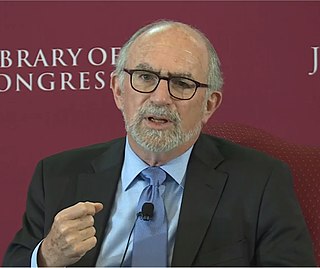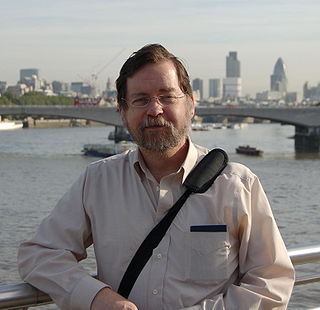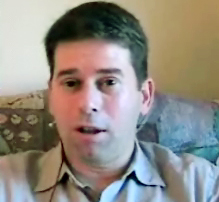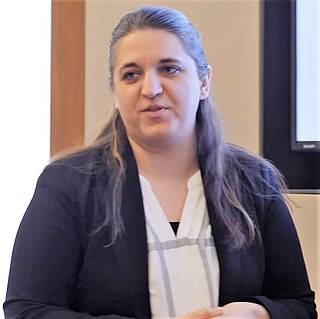Related Research Articles

The Volokh Conspiracy is a legal blog co-founded in 2002 by law professor Eugene Volokh, covering legal and political issues from an ideological orientation it describes as "generally libertarian, conservative, centrist, or some mixture of these." It is one of the most widely read and cited legal blogs in the United States. The blog is written by legal scholars and provides discussion on complex court decisions.

Bruce W. Jentleson is a professor of public policy and political science at Duke University, where he served from 2000 to 2005 as Director of the Terry Sanford Institute of Public Policy. He previously was a professor at the University of California, Davis and Director of the UC Davis Washington Center. In addition to his academic career, he has served in a number of foreign policy positions in Democratic administrations.

Ezra Klein is an American progressive journalist, political analyst, New York Times columnist, and the host of The Ezra Klein Show podcast. He is a co-founder of Vox and formerly served as the website's editor-at-large. He has held editorial positions at The Washington Post and The American Prospect, and was a regular contributor to Bloomberg News and MSNBC. His first book, Why We're Polarized, was published by Simon & Schuster in January 2020.
ScienceBlogs is an invitation-only blog network and virtual community that operated initially for almost 12 years, from 2006 to 2017. It was created by Seed Media Group to enhance public understanding of science. Each blog had its own theme, speciality and author(s) and was not subject to editorial control. Authors included active scientists working in industry, universities and medical schools as well as college professors, physicians, professional writers, graduate students, and post-docs. On 24 January 2015, 19 of the blogs had seen posting in the past month. 11 of these had been on ScienceBlogs since 2006. ScienceBlogs shut down at the end of October 2017. In late August 2018, the website's front page displayed a notice suggesting it was about to become active once again.
Philip A. Klinkner is an American political scientist, blogger and author. He is noted for his work on American politics, especially political parties and elections, race and American politics, and American political history.

Paul Zachary Myers is an American biologist who founded and writes the Pharyngula science blog. He is associate professor of biology at the University of Minnesota Morris (UMM) where he works in the field of developmental biology. He is a critic of intelligent design and the creationist movement and other pseudoscientific concepts.

Daniel W. Drezner is an American political scientist. He is known for his scholarship and commentary on International Relations and International Political Economy.

Andrew Eric Gelman is an American statistician and professor of statistics and political science at Columbia University.
Jennifer Rubin is an American political commentator who writes opinion columns for The Washington Post. Previously she worked at Commentary, PJ Media, Human Events, and The Weekly Standard. Her work has been published in media outlets including Politico, New York Post, New York Daily News, National Review, and The Jerusalem Post.
Skeptical Science is a climate science blog and information resource created in 2007 by Australian former cartoonist and web developer, John Cook, who received a PhD degree in cognitive science in 2016. In addition to publishing articles on current events relating to climate science and climate policy, the site maintains a database of articles analyzing the merit of arguments put forth by those who oppose the mainstream scientific opinion on climate change.
Christopher Blattman is a Canadian-American economist and political scientist working on conflict, crime, and international development. He is the Ramalee E. Pearson Professor of Global Conflict Studies at the University of Chicago's Harris School of Public Policy Studies and The Pearson Institute for the Study and Resolution of Global Conflicts. He is active on Twitter as well as an early blogger on international economics and politics. He is the author of Why We Fight: The Roots of War and the Paths to Peace, published by Viking Press in 2022.
Danielle N. Lee is an American assistant professor of biology at Southern Illinois University Edwardsville, best known for her science blogging and outreach efforts focused on increasing minority participation in STEM fields. Her research interests focus on the connections between ecology and evolution and its contribution to animal behavior. In 2017, Lee was selected as a National Geographic Emerging Explorer. With this position Lee traveled to Tanzania to research the behavior and biology of landmine-sniffing African giant pouched rats.
A graduate student journal is an academic journal which is run by graduate students.
Sarah A. Binder is an American political scientist, author, senior fellow with the Brookings Institution, and professor of political science at George Washington University's Columbian College of Arts and Science.
Denise Walsh is an American political scientist, currently a professor of political science and women, gender and sexuality at the University of Virginia. She studies the relationship between women's rights and political inclusion and level of democracy, as well as women's advancement during periods of democratization.

Julia R. Azari is an American political scientist. She is a professor of political science at Marquette University, where she is also the assistant chair of the Department of Political Science. Azari studies the American presidency and political parties in the United States, with particular attention to partisanship in the United States and how these systems have changed since the early 20th century. Azari also engages in public communication about political science, including as a frequent contributor to the politics coverage of the data journalism website FiveThirtyEight, a writer of the blog Mischiefs of Faction, and a host of the political science podcast Politics in Question.
Elizabeth N. Saunders is an American political scientist. She is associate professor in the School of Foreign Service at Georgetown University. She is an editor of The Washington Post's Monkey Cage blog. She is known for her research on international relations and foreign policy, in particular examining the domestic politics of U.S. foreign policy, and the foreign policy behavior of leaders.
John M. Sides is an American political scientist.
Kim Yi Dionne is an American political scientist specializing in politics and public opinion in African countries. She is an associate professor at the University of California, Riverside.
References
- ↑ Kafka, Alexander C. (2016-01-10). "How the Monkey Cage Went Ape". The Chronicle of Higher Education. ISSN 0009-5982 . Retrieved 2020-03-13.
- ↑ Gold, Hadas (26 August 2013). "Monkey Cage to Washington Post". POLITICO. Retrieved 2020-03-13.
- ↑ "The Monkey Cage joins The Washington Post in a Wonkbloggy, 538ish deal". Nieman Lab. Retrieved 2020-03-13.
- 1 2 TMC Editorial Team (5 December 2022). "A transition for TMC (The Monkey Cage): Moving on from The Washington Post". Washington Post. Retrieved 30 May 2023.
- 1 2 "How academic blog 'Monkey Cage' became part of the mainstream media". www.insidehighered.com. Retrieved 2020-03-13.
- 1 2 Nexon, Dan (2021-07-11). "The Vision Thing: More on the New Duck". The Duck of Minerva. Retrieved 2021-07-14.
- ↑ "About The Monkey Cage". The Washington Post. 2019. Retrieved 30 May 2023.
- 1 2 3 Sides, John (2011). "The Political Scientist as a Blogger". PS: Political Science & Politics. 44 (2): 267–271. doi:10.1017/S1049096511000060. ISSN 1537-5935. S2CID 154727650.
- ↑ Farley, Robert (2013). "Complicating the Political Scientist as Blogger". PS: Political Science & Politics. 46 (2): 383–386. doi: 10.1017/S1049096513000061 . ISSN 1049-0965.
- ↑ "About". Good Authority. 2023-09-21. Retrieved 2023-11-26.